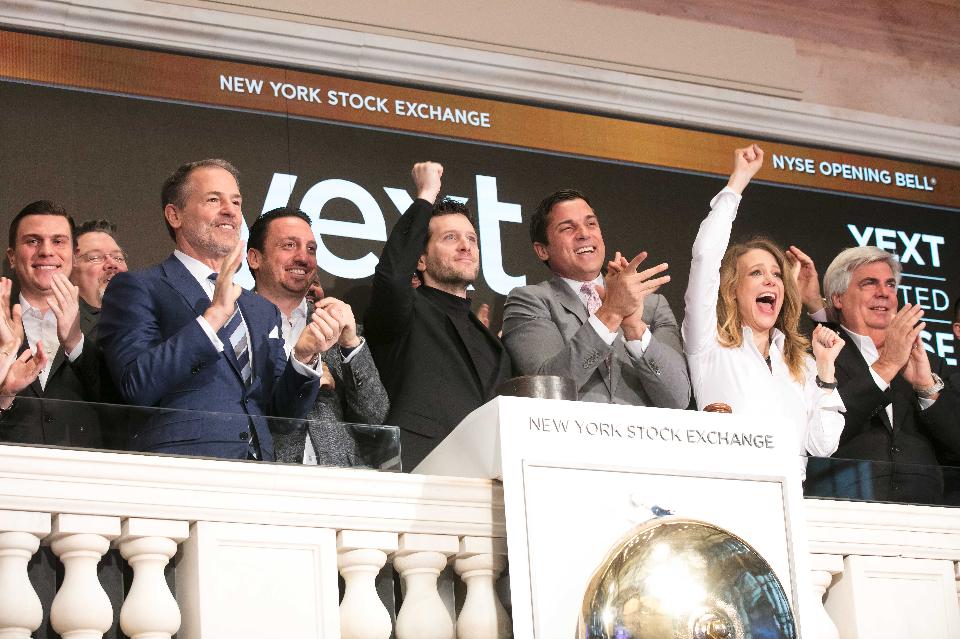
Yext rings the bell at the New York Stock Exchange on April 13, 2017.
Yext wasn’t quite a unicorn as a private software company. After its first day trading on the New York Stock Exchange, it’s even better: a $1 billion public one instead.
Yext drew healthy interest from investors on its first day of trading on Thursday, with shares trading as high as $14.25 after pricing at $11 for its IPO. Shares were up 25% as of 2:15 pm, boosting the market capitalization of the company to more than $1.1 billion. At the company’s last fundraise in 2014, it had been valued at $525 million, according to data from PitchBook.
After Okta’s IPO last week and compared to other recent tech exits such as AppDynamics’ $3.7 billion acquisition by Cisco and the IPOs for Mulesoft and Snap, Yext’s public offering was more meager in scale. The company lost $43 million on revenue of $124 million in its past fiscal year, five years since CEO Howard Lerman repurposed the company, selling its previous and profitable advertising business to IAC for $30 million to focus on helping companies track their digital identities across the Web. Today Yext works with customers to manage their digital listings across more than 100 third-party providers such as Apple’s iOS, Google search and Facebook.
While some tech companies have shunned the public markets for the structure and accountability to investors and a quarterly earnings cycle that listing brings, Lerman says that the move made since for Yext given the nature of its revenue model and customer base. As a subscription software business, Yext already has clear visibility into its revenue growth and billings for the foreseeable future, the cofounder says; with financial services a major customer base, Yext also already needed auditing on par with the IPO process.
Still, for a company more five-years-old than its formal founding in 2006 would imply, Yext jumped into the public markets earlier than many of its peers today. The company likely could’ve raised more private capital on par with the more than $100 million it’s taken in from the IPO, without the complexity of navigating the public markets. For Lerman, the reason to still go public is something of a throwback to earlier eras of quick IPOs: marketing and visibility.
“A lot of folks hadn’t heard of us before today. It’s an extraordinary marketing event,” Lerman says. “This is a winner-take-all market, and this IPO gives us the credibility, capital and awareness to accelerate what we do.”
Yext is betting that it can become the leader in what its chief executive calls, somewhat grandly, “digital knowledge management.” With micro-services booming to help us find the answers to questions from where to eat, how to find the right expert for a problem or when a business opens, Yext wants to be the layer of common information that ensures a business’s correct information is conveyed the same across Google, a phone app or over Siri and Alexa. “We are moving toward structured answers,” says Lerman. That means not just what SUVs might be available, but the mid-sized ones in a certain geographic radius, or orthopedists in one neighborhood who take the right health insurance. When you Google an Arby’s nearby, Yext pulls up the correct menu for that location behind the scenes.
It all sounds a little like Pied Piper’s early pitch in the HBO show ‘Silicon Valley,’ to own the pipes that the leading consumer-facing services use—the cliche of providing the picks and shovels during a gold rush, not prospecting one’s self. That helps explain why even as Lerman touts a $10 billion-plus total market that he’s chasing, he recognizes that speed is of the essence. While other software companies shy away from pursuing growth at all costs, Lerman’s something of a throwback there, too, arguing that his company’s spending it largely on sales and marketing it can turn off as need be, with many recent hires from late last year not yet to make their mark on the balance sheet. “We wanted to get out there and win,” he says.





[“Source-forbes”]